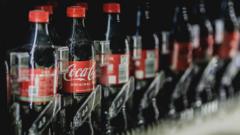Quincey acknowledged that while packaging costs are relatively minor in Coca-Cola’s overall expenses, heightened aluminium costs might compel the company to emphasize cheaper packaging alternatives, such as plastic. This shift could signal a setback in sustainability efforts as Coca-Cola moves towards a more plastic-centric approach, further intensifying ongoing debates about plastic pollution.
Despite being more environmentally friendly, aluminium cans are often less cost-effective in light of rising tariffs. The situation is compounded by a recent executive order from Trump, rolling back efforts to curtail plastic use in favor of alternatives like paper straws, highlighting the broader context of environmental policy reversals in the current administration.
As Coca-Cola balances business operations with its ecological responsibilities, it remains to be seen how these economic and political challenges will shape their packaging decisions in the future.
Despite being more environmentally friendly, aluminium cans are often less cost-effective in light of rising tariffs. The situation is compounded by a recent executive order from Trump, rolling back efforts to curtail plastic use in favor of alternatives like paper straws, highlighting the broader context of environmental policy reversals in the current administration.
As Coca-Cola balances business operations with its ecological responsibilities, it remains to be seen how these economic and political challenges will shape their packaging decisions in the future.



















